Digestive Enzymes vs Probiotics: Differences, Sources And Safety

Digestive enzymes refer to natural substances that aid in the breakdown and digestion of food for better nutrient absorption. Probiotics, on the other hand, refer to beneficial live bacteria and yeasts that support a healthy balance of gut microflora as defined by NIH.
When choosing digestive enzymes or probiotics, it should be understood that the primary difference between them lies in their respective functions: digestive enzymes aid in the breakdown of food and nutrient absorption, while probiotics introduce beneficial microorganisms to support gut health and overall well-being.
As per their definition, digestive enzymes are naturally produced by the body to support the breakdown of food and are delivered through the digestive system, whereas probiotics are live microorganisms that are delivered through supplements or fermented foods to promote a healthy balance of gut bacteria.
What Are Digestive Enzymes?

Digestive enzymes are microscopic protein molecules that play a vital role in breaking down the different types of food molecules, such as carbohydrates, proteins, and fats, into smaller components.
These enzymes are produced in various locations throughout the gastrointestinal tract and assist in the digestion and absorption of nutrients, allowing them to be utilized by the body for energy and other essential functions.
There are three main groups of digestive enzymes: amylases for carbohydrates, proteases for proteins, and lipases for fats.
- 1Amylases are digestive enzymes that specifically break down carbohydrates into simple sugars, facilitating their absorption and utilization by the body.
- 2Lipases are digestive enzymes that specialize in breaking down fats, oils, and triglycerides into smaller components, aiding in their digestion and absorption by the body.
- 3Proteases are digestive enzymes that are responsible for breaking down proteins into individual amino acids, enabling their absorption and utilization for various physiological processes within the body.
Where Are Digestive Enzymes Produced?
Digestive enzymes are produced in various locations throughout the gastrointestinal tract, including the salivary glands, stomach, small intestine and pancreas. The pancreas produces digestive enzymes, including amylase, lipase, trypsinogen, chymotrypsinogen, procarboxypeptidase, and proelastase, which are released into the small intestine.
These enzymes break down starch, fats, and proteins into smaller molecules for absorption. To prevent self-digestion, the pancreas releases inactive forms of these enzymes, which are activated in the small intestine. The activated enzymes, along with bile, aid in the digestion and absorption of nutrients.
What Do Digestive Enzymes Do?
Digestive enzymes serve an important purpose in our bodies because they aid in converting nutrients from food into energy but also play a significant role in facilitating essential bodily functions. These enzymes can be particularly beneficial when it comes to alleviating uncomfortable digestive symptoms like acid reflux, constipation, nausea, and bloating.
The digestive process kicks off in the mouth with saliva initiating the breakdown of food, known as the cephalic stage. As food travels through the digestive system, enzymes are released and activated at different stages, ensuring efficient digestion and nutrient absorption.
What Foods Contain Digestive Enzymes?
Many bitter foods can stimulate the production of digestive enzymes that can be beneficial for digestion. The following 9 foods below contain digestive enzymes.

- 1Papaya contains the natural digestive enzyme papain, which assists in the breakdown of proteins during digestion.
- 2Kiwifruit contains actinidain, a natural digestive enzyme that aids in the digestion and breakdown of proteins.
- 3Ginger contains zingibain, a digestive enzyme that assists in the digestion of proteins and helps improve overall digestive health.
- 4Mangoes contain amylase, a digestive enzyme that aids in the breakdown of complex carbohydrates into simpler sugars during the digestion process.
- 5Bananas contain amylases and glucosidases, which are digestive enzymes involved in the breakdown of carbohydrates into simpler forms, such as glucose, to facilitate digestion and nutrient absorption.
- 6Pineapple contains bromelain, a mixture of proteolytic enzymes that aids in the digestion of proteins.
- 7Avocados contain the digestive enzyme lipase, which assists in the breakdown and digestion of dietary fats.
- 8Honey contains a variety of digestive enzymes, including diastase, amylase, invertase, and protease, which aid in the digestion and breakdown of carbohydrates, sugars, and proteins.
- 9Kimchi contains bacteria of the Bacillus species, which produce proteases, lipases, and amylases. These enzymes play a role in breaking down proteins, fats, and carbohydrates present in kimchi, aiding in the digestion process and enhancing the flavors of this traditional Korean dish.
Can I Take Probiotics With Digestive Enzymes?
Yes, it is generally safe to take probiotics with digestive enzymes together at the same time. Probiotics are beneficial bacteria that support gut health, while digestive enzymes help break down food for better digestion. Combining these two supplements can provide complementary benefits and support overall digestive function.
Can Digestive Enzymes Kill Probiotics?
No, digestive enzymes do not typically kill probiotics when taken together at the same time. Digestive enzymes have enzymatic activity and are not known to specifically target and kill probiotics.
Are Digestive Enzymes Supplements Safe?
Digestive Enzyme OTC supplements are generally considered safe but aren't regulated by the FDA which means the dosages, ingredient quality, and side effects cannot be guaranteed. To ensure your digestive supplement is safe make sure to talk to your doctor first, especially if you are pregnant. It's best to use digestive enzyme supplements as a short-term solution while working on natural ways to improve digestion and enzyme production.
Dr. Sara Mesilhy has a Master’s degree in Gastroenterology and holds a membership with the Royal College of Physicians of the United Kingdom. She completed her Bachelor of Medicine, Bachelor of Surgery (MBBS) at Cairo University and is currently part of the ProbioticReviewGirl medical team.